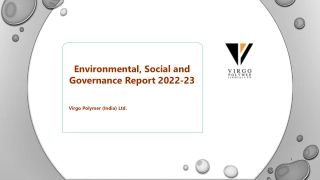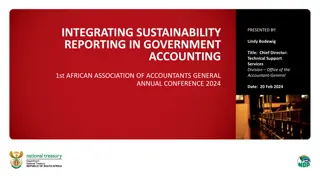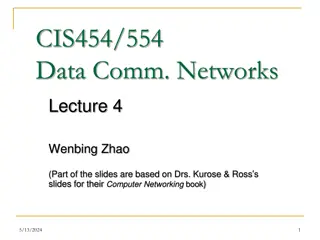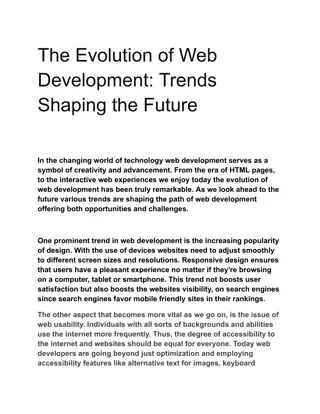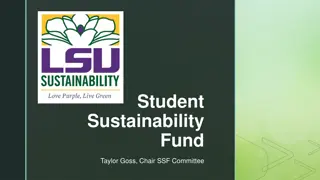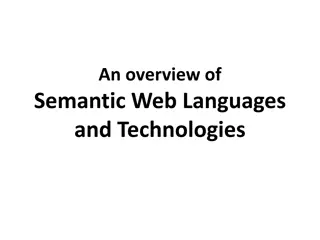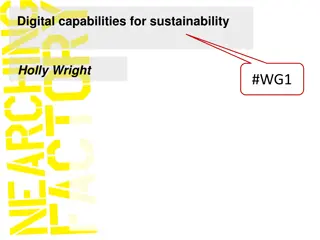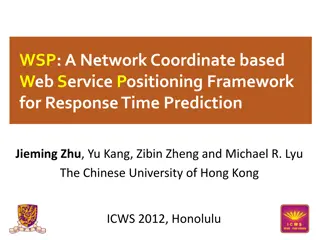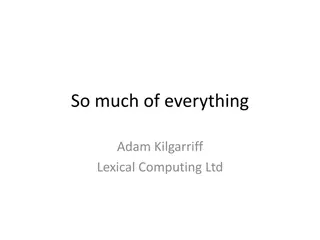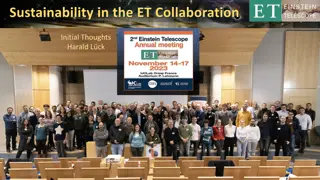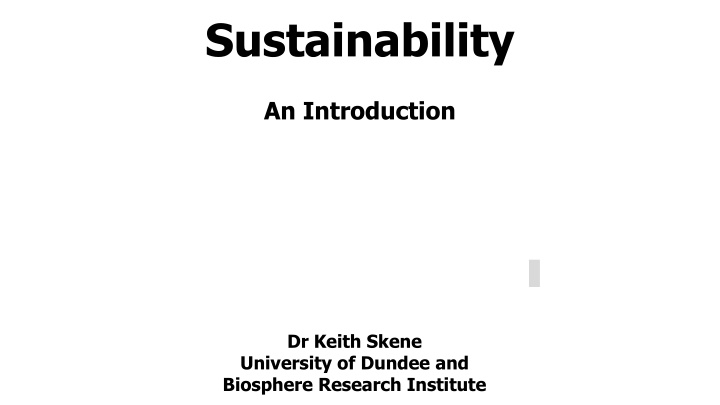
Exploring Sustainability Through Concepts and History
Delve into the realms of sustainability through the etymology of the word, Michel Foucault's genealogical approach to history, and the evolution of the term "sustainable." Reflect on the human-centric view of maintaining the status quo and the importance of reducing rather than replacing technologies in achieving true sustainability. Uncover the thought-provoking discourse on Agenda 30 and the future of our relationship with the planet.
Download Presentation

Please find below an Image/Link to download the presentation.
The content on the website is provided AS IS for your information and personal use only. It may not be sold, licensed, or shared on other websites without obtaining consent from the author. If you encounter any issues during the download, it is possible that the publisher has removed the file from their server.
You are allowed to download the files provided on this website for personal or commercial use, subject to the condition that they are used lawfully. All files are the property of their respective owners.
The content on the website is provided AS IS for your information and personal use only. It may not be sold, licensed, or shared on other websites without obtaining consent from the author.
E N D
Presentation Transcript
Sustainability An Introduction Dr Keith Skene University of Dundee and Biosphere Research Institute
Webpage https://biosri.org/sustainability2024.html
Michel Foucaults conceptualization of the history of ideas Foucault (1984) proposed that histories of ideas should be genealogical Foucault s history relies on the telling of descent which traces the myriad events through which thanks to which, against which they were formed A creative tension Sustainability is a case in point.
Etymology of sustain Latin: sub "up from below" + tenere "to hold Old French sustenir: "hold up, bear; suffer, endure In law: sense of "admit as correct and valid, uphold the rightfulness of"
Sustainable 1610s: "bearable" 1845: "defensible, capable of being upheld 1965: "capable of being continued or maintained at a certain level"
Plastic words Development Civilization Progress Conservation Ecological Rewilding Sustainability
Maintaining some status quo? Human-centric in its focus management of the environment in such a way that we can continue to exist in our present state Where ecosystems can continue to service our needs and greed, and those of our children and grandchildren.
So many green technologies replace existent technologies Same behaviours Different ways of doing the same thing Fundamental issues here REDUCE not REPLACE
Agenda 30: The future we want It s all about us Ecosystem services serving us Masters of all we survey How dare the planet work against us? Neocolonial sustainability theory.
AND DEVELOPMENT IS SUSTAINABLE . George Orwell, Nineteen Eighty-Four (1949) Sustainable development: an Orwellian doublethink?
The true meaning of sustainability The Biosphere, as a system, is emergent, surprising and creative Unleashing nature rather than suffering from the Garden of Eden Complex.
The Garden of Eden Complex We ve got to get ourselves back to the Garden Yet emergence of the new is essential for sustainability The garden is not a place of static equilibrium and a fixed destination Rather, it is a journey A laboratory of creativity, of death and renewal A process not a form.
Joni Mitchell And we've got to get ourselves back to the garden
Il faut cultiver son jardin Peace means an unending fight against disease and slums, ignorance and economic injustice, against deforestation and waste of natural resources; peace means, both concretely and figuratively, that everyone must cultivate his garden Patrick Geddes Cities in evolution, 1915
Il faut cultiver son jardin Voltaire s (aka Fran ois-Marie Arouet) radically enlightened critique of professional academic philosophy as abstract, world-alienated, self- alienating, sanctimonious theorizing Akin to modern neoliberalism Call to real or field philosophy a working philosophy 1694 1778
Henry David Thoreau: Walden (1854) To be a philosopher is not merely to have subtle thoughts, nor even to found a school, but so to love wisdom as to live according to its dictates, life of simplicity, independence, magnanimity, and trust. It is to solve some of the problems of life, not only theoretically, but practically.
Function not form Sustainable function? Earth System functionality The process of diversification, not diversity itself Unleashing the healing power and creativity within the system
DArcy Thompson (1860-1948) "we rise from the conception of form to an understanding of the forces which gave rise to it." On Growth and Form. 1917
Issues around sustainability Not a constraint or selection but a liberation and diffusion Not a destination but a journey Learning for Sustainability should empower the next generation to flourish and grow not continue our erroneous path forward But does it?
Environmental education became tied to the sustainable development concept development needs of the present without compromising the ability of future generations to meet their own needs that meets the 1987
Paper on critique of SDGs Skene, K.R. (2021). No goal is an island: the implications of systems theory for the Sustainable Development Goals. Environment, Development and Sustainability 23: 9993 10012.
Not the maintenance of forms nor lifestyles Embracing functionalism and the essence of function The creative force within 1. Ecological succession
Mass Extinctions FUNCTION File:Lycopodium plant.jpg FORM Lycopoda Glossopterids Magnolia Poaceae Eryops Postosuchus Tawa Smilodon
Shakespeare Analogy The actors may change through time, but the play stays the same It is the play that drives the players And the play is FUNCTION, not FORM
Diversity is function It is the functional role that lies at the heart of the matter By reducing diversity we reduce function By impacting upon function, we impact on ourselves Don t ask for whom the bell tolls It tolls for thee John Donne Meditation 17 Devotions upon Emergent Occasions
Functionality, system theory and sustainability Papers/Chapters for further reading (see web page) Skene, K.R. (2024). Systems theory, thermodynamics and life: Integrated thinking across ecology, organization and biological evolution. Biosystems, p.105123. Skene, K.R. and Oarga-Mulec, A. (2024). The circular economy: the butterfly diagram, systems theory and the economic pluriverse. Journal of Circular Economy, 2 (3). Skene, K.R. (2023). Biosphere Evolution, Ecology and Sustainability: Why Thermodynamics and System Theory Matter. In: B. Veress and J. Szigethy, eds. Horizons in Earth Science Research Volume 24 pp. 1-46. Nova Science Publishers. Skene, K.R. (2022). How can economics contribute to environmental and social sustainability? The significance of systems theory and the embedded economy. Frontiers in Sustainability, p.107.
Spatial Issues A Sustainability Pluriverse Not a global approach One size cannot fit all Local landscapes, ecosystems and biomes
Temporal issues The Earth System is not a Lego kit Cyclical changes defy rectilinear logic Ripples of interacting timescales pervade a system Non-linear time a fundamental aspect of indigenous knowledge A temporal pluriverse
The importance of Place: Genius Loci
Genius loci The protective spirit of a place It was often depicted in religious iconography as a figure holding attributes such as a cornucopia, a snake or a unicorn.
Genius loci: the protective spirit of a place The deification of Nature Places of inspiration and sacredness That mythical meaning of the notion genius loci from a deep spiritual bond with nature was broken in the Middle Ages Gardens became enclosed, the commons diminished.
Genius loci: the protective spirit of a place Genius loci. Edward Ende, 1936.
The method of Loci Memories linked to landscape, where landscape acts as a mnemonic The landscape is intertwined with stories and memories Seen in the Sami of Northern Scandinavia
Indigenous cosmologies system thinking Most indigenous cosmologies perceive everything in the Universe as interconnected and interdependent Nature and the human realm are experienced with a sense of unity and mutual belonging
The importance of landscape in traditional life A landscape represents a multidimensional, multitemporal meeting place Nature as a bridge, a communicator, a celebrant and a record The oral tradition is set in this complex dynamic environment
The physical and the metaphysical as one A beautiful, monistic approach, where all is intertwined with all else A powerful theme repeated across indigenous oral traditions Complexity, multidimensionality and integrity are emphasised
The English philosopher Lord Shaftesbury (1671 1713) The English philosopher Lord Shaftesbury (1671 1713) emphasised that landscapes are personalities that derive meaning from their being itself Natural rockeries, systems of streams and flower meadows represent the outpouring of the genius in forms and in dynamic forces The adoration of these unrestrained or natural forms, have been seen as the factory of the genius loci.
Ecology of mind: Dthchas The Celtic sustainability philosophy D thchas in Scottish Gaelic (D chas in Irish Gaelic) From the Gaelic word d /d th , meaning earth or land An intrinsic part of the Gaelic worldview (Deirdre N Mhath na (2021). Traditional ecological knowledge and the relevance of D thchas in G idhealtachd environmental futures. Scottish Affairs 30(2): 251-261.
Sen Tuama (1985): There is a sense in which place finally becomes co-extensive in the mind, not only with personal and ancestral memories, but with the whole living community culture Community becomes place, place community.
A socio-environmental approach Not a silo approach But, as the Earth system, integrated Process not destination Function not form Systemic not structural
Crofter and world-renowned knitwear designer Alice Starmore describes d thchas as: a feeling of belonging, of where everything is linked, completely linked. Where you belong to the land, and the land belongs to you there is no distinction. It s like a hand in a glove. Everything fits in, and your culture is part of that as well, and everything you know that s around you; every part of life that s around you is all interlinked and interdependent, and it s all about ancestry, knowing where you ve come from and that you are a continuation of all that.
An imagining of a different world where we think and act in unison with the Earth system
Steffen et al. (2020) write that: For tens of thousands of years, indigenous cultures around the world have recognized cycles and systems in the environment, and that humans are an integral part of these .
Ethical environmental behaviour Humans have been practicing ethical environmental sustainability within the context of their landscapes for millennia. Recent research points to current sustainable indigenous practices as a blueprint for sustainable behaviour (Kupa'a et al., 2021; Ferguson et al., 2022; Reeder-Myers et al., 2022).

